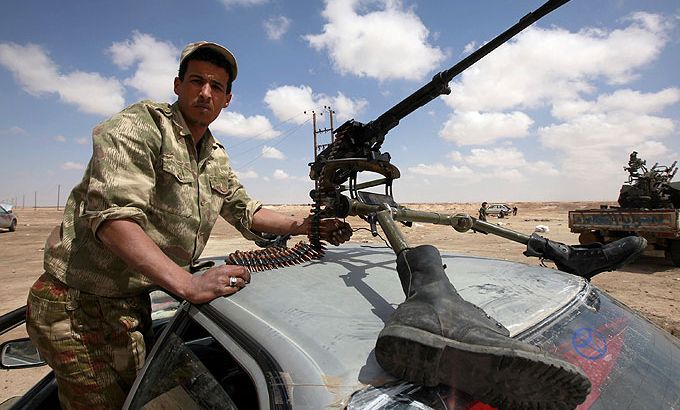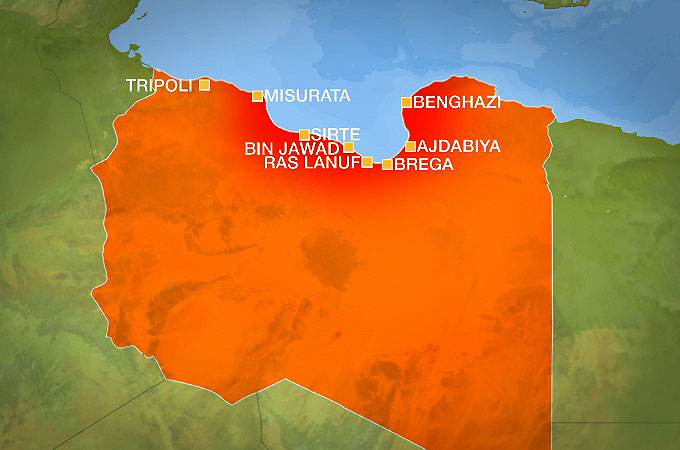Gaddafi’s forces battle rebels for Brega
Clashes on outskirts of town east of capital, as opposition calls for government siege on western cities to be lifted.

Anti-government fighters are locked in a fierce battle with government troops for control of Libya’s eastern oil town of Brega.
The two sides clashed on the outskirts of the town on Friday a day after pro-democracy forces scrambled to flee amidst fighting with troops loyal to Libyan leader Muammar Gaddafi.
Al Jazeera’s Sue Turton, reporting from the frontlines of the battle to reclaim Brega from pro-Gaddafi forces, said that overnight NATO air strikes allowed the pro-democracy fighters to gain some momentum, with discipline and co-ordination improving.
“They sent spotters out on the flanks before moving a unit forward,” Turton said. “It worked for a while before the more excitable rushed forward.”
Gaddafi’s forces, she said, reacted swiftly.
“Mortars obliterated one car and damaged two others. These rookie soldiers are learning the hard way,” Turton reported.
Gateway to the east
Some rebel forces fell back earlier this week as far as the town of Ajdabiya, the gateway to the east about 150km south of the pro-democracy stronghold of Benghazi. Ajdabiya was still in rebel hands on Thursday, however.
 |
Pro-democracy fighters and forces loyal to Gaddafi have been fighting across a strip of land between Ajdabiya and the town of Bin Jawad for weeks.
The rebels are armed mainly with pick-ups mounted with machine guns and rocket-propelled grenade launchers and have been unable to hold on to gains despite almost two weeks of air strikes by coalition forces, which can’t seem to decide whether to arm the pro-democracy forces.
Al Jazeera’s Lawrence Lee, reporting from Benghazi, said that there seems to be an impasse on the issue.
“Neither side is strong enough to push through by themselves, and something has to give. And it may be that what we’re seeing on the ground, tactically, from the rebels, suggests there is change,” said Lee, referring to the more disciplined style of combat in which the rebels seem to be engaging.
“What that change will mean in practical terms, clearly, has yet to be seen.”
A day earlier, the town of Misurata reportedly came under heavy attack from Gaddafi’s forces, with the frontline moving closer to Ajdabiya.
Misurata – the last major rebel stronghold in western Libya – has been encircled by pro-Gaddafi forces for weeks and repeated coalition air strikes aimed at protecting civilians there have not stopped them.
Mustafa Abdul Jalil, Gaddafi’s former justice minister who is currently heading the transitional council out of eastern Libya, on Friday demanded the siege on western Libyan cities, including Misurata, to be lifted.
The ceasefire offer was put forth by Abdelilah Al-Khatib, the UN envoy to Libya, who is visiting the rebels’ de-facto stronghold of Benghazi in hopes of reaching a ceasefire and political solution to the crisis embroiling the North African nation.
Civilian casualties
Amid the political manoeuvres, fighting continued. A rebel spokesman said pro-Gaddafi forces shelled Misurata on Thursday, leaving dozens of civilians dead in the past few days when their homes were hit.
“Massacres are taking place in Misurata,” the rebel spokesman, called Sami, told the Reuters news agency by telephone.
 |
“Artillery bombardment resumed this morning and is still going on. The [pro-Gaddafi] brigades could not enter the town but they are surrounding it.
“Twenty civilians were killed yesterday after their houses were hit by bombardments. Many people were wounded.”
Residents say that figure added to the dozens who have been killed in fighting over the past 10 days.
Meanwhile, a NATO commander on Thursday said the bloc was taking seriously reports of civilian casualties in coalition air raids over Libya.
A top Vatican official citing reliable sources in close contact with residents told Reuters at least 40 civilians have been killed in air strikes over Tripoli.
“It is a news report and I appreciate the source of this report but it is worth noting that I take every one of those issues seriously,” Lieutenant-General Charles Bouchard, the Canadian commander of the coalition’s military operations over Libya, said.
US government officials said on Wednesday that Barack Obama, the US president, had signed an order to provide the rebels with covert support.